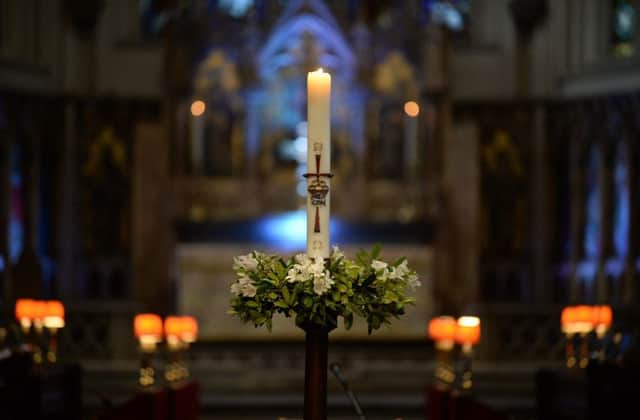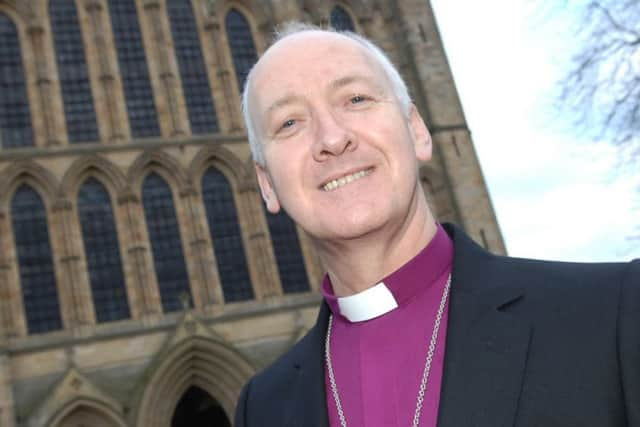Do we need more TV programmes about religion?


For many people Christmas is a time of enjoyment, a chance to spend some quality time with friends and family. It’s also an opportunity to take stock and reflect as another year draws to a close. Religion and its inherent message of kindness and helping others is at the heart of Christmas yet increasingly it seems drowned out by the rampant commercialisation of the festive season.
In many ways consumerism has become the new religion, evident in the vast sums of money spent on food and gifts and the countdown to Christmas, which seems to start earlier with each passing year. There’s a feeling among many worshippers that religion, and, some argue, the Christian faith in particular, is being pushed towards the margins.
Advertisement
Hide AdAdvertisement
Hide AdBut isn’t this merely a sign of people’s changing attitudes? The latest figures from the National Centre for Social Research’s (NatCen) social attitudes survey, reveals that Britain is becoming an increasingly godless society with more than half of the population now describing themselves as having “no religion”.


The proportion of non-believers has reached a record high of 53 per cent – a dramatic change from 1983 when just three in 10 people in the UK called themselves non-religious.
There are some stark differences, with many more younger people shunning religion than older generations, while the proportion of people who consider themselves Anglican has dropped from 30 per cent in 2000 to just 15 per cent.
This has led to renewed calls for the Government to cut the amount of public money going to the Church and given credence to those who say its influence is on the wane.
Advertisement
Hide AdAdvertisement
Hide AdThe debate has been thrown into the spotlight once again with the BBC pledging to increase the portrayal of all faiths in mainstream shows and improve the representation of religion on TV and in radio dramas and documentaries.


It also plans to create a new global religious affairs team, headed by a religion editor, and confirmed it will keep Thought For The Day on Radio 4’s Today programme – despite presenter John Humphrys recently saying it’s often “deeply, deeply boring”.
This follows the publication yesterday of a review of its coverage of religion and ethics, with BBC Director General Tony Hall saying that audiences, whether they regard themselves as religious or not, have said they want to learn more about those topics.
The Bishop of Leeds, the Rt Rev Nick Baines, says awareness of the importance of religion around the world is crucial. “This goes to the heart of the matter. Religious broadcasting is not about proselytism or evangelism. It is about enabling people to understand the world and why it is the way it is.”
Advertisement
Hide AdAdvertisement
Hide AdWriting in a blog, he said the vast majority of people in the world have a religious faith, worldview or culture. “They derive their motivations, comprehensions and assumptions about human beings, human behaviour, place in the world, and social order from the lens through which they look.”
He says the challenge now is for the BBC to make good on its pledges. “My questions are the usual ones: who, when, how and how much. In other words, when will we see the plan that clarifies who is responsible for establishing clear means to achieve these important aims, what are the timelines for delivery, and how much resource will be committed to making sure the promises are realised?”
There is, however, a growing trend away from religion in this country, though the Bishop argues that Britain is an “abnormality” when it comes to matters of faith.
Speaking to The Yorkshire Post he said: “Around 85 per cent of the world’s population is religious, however we define that and you can’t understand the world without understanding religion.”
Advertisement
Hide AdAdvertisement
Hide AdHe believes the BBC’s decision to create a religious editor is a significant step forward. “How many people are interested in business or economics or even football? Yet look at the resources they receive. More people go to church on a Sunday than attend football matches, so what does that say?”
However, Stephen Evans, chief executive of the National Secular Society, is more circumspect. “There should always be a place for good quality, informative and entertaining programming about religion and belief. But the BBC’s tendency towards sycophancy and fawning coverage isn’t appropriate and doesn’t represent today’s religion and belief landscape.
“Given that the BBC went to great lengths to consult faith representatives during the review, its unsurprising that the final report has reflected their priorities – which are often out of touch not only among the non-religious majority, but many of those who follow religion.
“Most people in Britain are indifferent to religion and don’t organise around religious identities, true diversity should reflect that.”
Advertisement
Hide AdAdvertisement
Hide AdThe review calls for the development of a network of religious experts within the BBC to help staff cover ‘sensitive’ issues. However, Evans says religion must be criticised if it’s necessary.
“Improving genuine religion and belief literacy is a worthwhile aim, but that involves criticising religion as well as defending it. Too often the concept is used to promote faith and present it in a positive light rather than reflecting the social reality of religion, including its negative impact on people’s lives.”
But although religion perhaps doesn’t play the same integral role it once did, we still turn to our religious leaders and places of worship for comfort during times of personal and national grief.
Qari Asim is chief imam at Leeds Makkah Mosque and a member of the Government’s anti-Muslim hatred working group. He welcomes the BBC’s announcement. “We live in a multi-faith and multi-belief society. We therefore desperately need to improve religious literacy in our country. In particular, Muslims feel that they are often misrepresented in the media due to lack of religious literacy.
Advertisement
Hide AdAdvertisement
Hide Ad“This step by BBC to broaden its religious, multi-faith programming on TV and radio will improve religious literacy amongst the journalists in particular,” he says.
Asim hopes it will also help address the lack of representation of religious people of different faiths, which he feels is creating a “terrible distortion” of reality.
“If we don’t show the diversity of our country on television, we not only exclude our neighbours but we also miss out on understanding the rich cultures and values they have to offer.
“Learning about, and appreciating, the religious views of our neighbours will go a long way toward strengthening civil society. More religious programmes on our TV screens will lead viewers to the conclusion that we’re all a lot more similar than we think.”